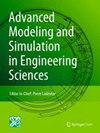The displacement mechanism of the cracked rock – a seismic design and prediction study using XFEM and ANNs
IF 3.2
Q3 MECHANICS
Advanced Modeling and Simulation in Engineering Sciences
Pub Date : 2024-02-28
DOI:10.1186/s40323-024-00261-7
引用次数: 0
Abstract
Materials with sufficient strength and stiffness can transfer nonlinear design loads without damage. The present study compares crack propagation speed and shape in rock-like material and sandstone when subjected to seismic acceleration. The nonlinear extended finite element method (NXFEM) has been used in numerical simulation. It assumes the model has a pre-existing crack at 0° from the horizontal. The mechanical properties of the model, crack propagation shape, and crack speed were selected as the main parameters. The nonlinear stress and strain along the crack have been compared in two simulated models. NXFEM and Artificial Neural Networks (ANNs) were used to predict the displacement. The simulation results illustrate that the materials’ crack propagation mechanism and mechanical properties control the stress, strain, and displacement at the selected points in the model. In addition, crack propagation in materials is related to elastic-plastic stresses and strains along the crack path. The speed and shape of the crack are associated with the mechanical properties of the materials. The prediction of crack paths helps to understand failure patterns. Comparison of the seismic response of the rock-like material with sandstone helps to assess the stress, strain, and displacement levels during cracking. This study’s findings agree with the literature report and field observations.开裂岩石的位移机理--利用 XFEM 和 ANNs 进行的抗震设计和预测研究
具有足够强度和刚度的材料可以传递非线性设计荷载而不会损坏。本研究比较了类岩石材料和砂岩在地震加速度作用下的裂纹扩展速度和形状。数值模拟采用了非线性扩展有限元法(NXFEM)。它假定模型在与水平面成 0°的位置有一条预先存在的裂缝。模型的力学性能、裂缝扩展形状和裂缝速度被选为主要参数。比较了两种模拟模型沿裂缝的非线性应力和应变。使用 NXFEM 和人工神经网络 (ANN) 预测位移。模拟结果表明,材料的裂纹扩展机制和机械性能控制着模型中选定点的应力、应变和位移。此外,材料中的裂纹扩展与裂纹路径上的弹塑性应力和应变有关。裂纹的速度和形状与材料的机械特性有关。对裂缝路径的预测有助于了解破坏模式。比较类岩石材料与砂岩的地震响应有助于评估开裂过程中的应力、应变和位移水平。本研究的结果与文献报告和现场观察结果一致。
本文章由计算机程序翻译,如有差异,请以英文原文为准。
求助全文
约1分钟内获得全文
求助全文
来源期刊

Advanced Modeling and Simulation in Engineering Sciences
Engineering-Engineering (miscellaneous)
CiteScore
6.80
自引率
0.00%
发文量
22
审稿时长
30 weeks
期刊介绍:
The research topics addressed by Advanced Modeling and Simulation in Engineering Sciences (AMSES) cover the vast domain of the advanced modeling and simulation of materials, processes and structures governed by the laws of mechanics. The emphasis is on advanced and innovative modeling approaches and numerical strategies. The main objective is to describe the actual physics of large mechanical systems with complicated geometries as accurately as possible using complex, highly nonlinear and coupled multiphysics and multiscale models, and then to carry out simulations with these complex models as rapidly as possible. In other words, this research revolves around efficient numerical modeling along with model verification and validation. Therefore, the corresponding papers deal with advanced modeling and simulation, efficient optimization, inverse analysis, data-driven computation and simulation-based control. These challenging issues require multidisciplinary efforts – particularly in modeling, numerical analysis and computer science – which are treated in this journal.
 求助内容:
求助内容: 应助结果提醒方式:
应助结果提醒方式:


